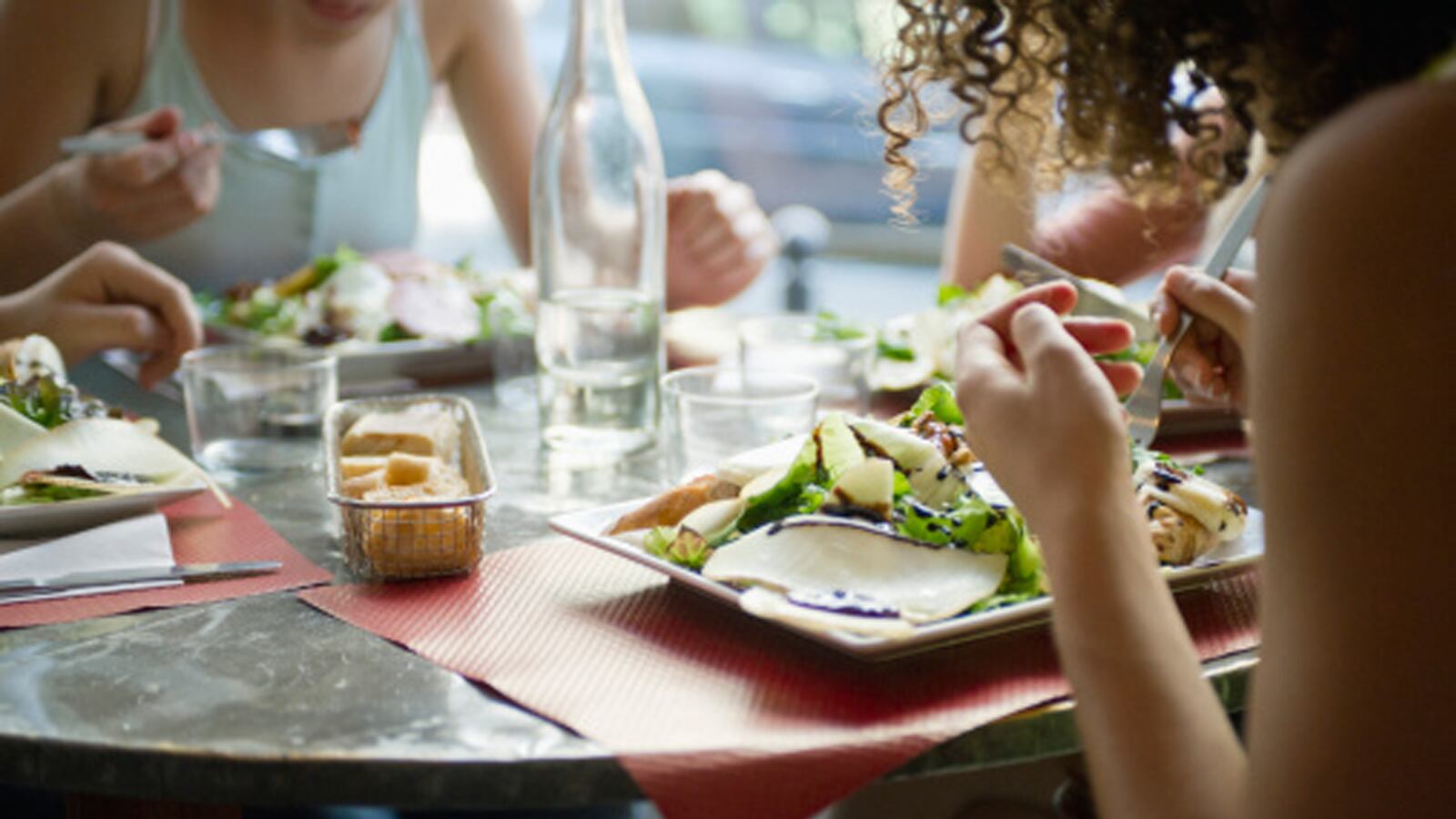By Sarah Elizabeth Richards for Life by DailyBurn
Three years ago, after suffering from chronic abdominal pain, digestive problems and a crushing breakup that left her depressed and sluggish, Ashley Bailey started researching whether “clean eating” could help her feel better. After learning that some people are intolerant to dairy, she cut milk and cheese from her diet and was relieved when her heartburn disappeared. But she didn’t stop there. Convinced she could detox her body even more, she researched other food groups that had been implicated in health problems and within a year had eliminated gluten, grains, meat, starchy vegetables and most fruits.
What started out as a genuine interest in becoming healthier quickly developed into an obsession. “I had extreme anxiety about everything I ate and became acutely aware of how every ingredient made my body feel,” says Bailey, 28, who works in software development in Boulder, Colorado. Eating out felt like torture because she couldn’t control how the food was prepared. Were the spices organic? Was the chicken raised in cages? Was sugar added to the sauce? Was a dish really gluten-free? “I broke down crying once because I could taste so many different flavors, and I didn’t know what they all were or where the ingredients were sourced,” she says.
In her quest for food purity, the 5’4” Bailey consumed so few calories she dropped to 92 pounds. Her moment of truth arrived a year ago when she saw a picture of herself from Christmas in which her collarbone was jutting out. “I called my sister and said, ‘I think I have an eating disorder,’” she says.
Extreme Health, Gone Wrong
If you follow a certain style of eating, like vegan, raw or organic, it takes vigilance and dedication to stick to it.
Yet mental health experts are increasingly worried about people who take healthy eating to an extreme, developing such a restrictive diet it threatens their health and even relationships.
Related: 5 Healthier Ways to Detox (That Aren't Juice Cleanses)
There’s now a name for people dangerously addicted to all things healthy — a sufferer of orthorexia nervosa. Characterized by disordered eating fueled by a desire for “clean” or “healthy” foods, those diagnosed with the condition are overly pre-occupied with the nutritional makeup of what they eat. They rigidly avoid any food they deem to be “unhealthy,” or spend excessive amounts of time and money in search of the “most pure” foods.
“It’s different than going overboard because you want to be skinny,” explains Thomas Dunn, PhD, associate professor of psychology at the University of Northern Colorado and co-author of a recent paper in Psychosomatics that outlines diagnostic criteria for the disorder. “Rather, it’s linked to people who are trying to be as healthy as they can be.”
The condition is under-studied, and no one knows how widespread it is. (“Avoidant/ Restrictive Food Intake Disorder” is orthorexia’s closest cousin in the latest edition of the Diagnostic and Statistical Manual of Mental Disorders.) But it’s on the rise in our ever-expanding food culture that now offers shoppers several kinds of kale, even in suburban supermarkets, says Dunn. “Some people can border on the irrational and only eat salmon prepared from this one place in Washington that was cooked over a cedar plank,” he says. “If you’re losing friends because no one wants to go out with you because you’re such a horrendous pain in the ass about where and what you’ll eat, you have a problem.”
Eating Well…Or Eating Obsessively?
The line between being careful about what you eat and being obsessive is difficult to distinguish. Especially in the U.S., where fast food restaurants are abundant and two-thirds of people are overweight or obese.
Do you run the risk of being labeled orthorexic if you refuse to eat at most mainstream restaurants, where nearly every sauce or salad dressing contains soybean oil or high-fructose corn syrup? Or will you be labeled “too extreme” if you choose to buy only local, organic produce? According to Sondra Kronberg, nutritional director of the Eating Disorder Treatment Collaborative, it depends on how much the fixation interferes with your quality of life, and your ability to be social and function.
Related: When Is It OK to Cheat? The Pros and Cons of Cheat Days
“Orthorexic eating becomes almost like a religion,” she says “It becomes a position instead of a preference. You can’t eat out with a friend. You can’t go to the party. You have to bring your own food wherever you go.” Health-conscious eaters might prefer fresh foods, but won’t fall apart if they eat a handful of tortilla chips at a party. At the other extreme, an orthorexic person might skip a cruise vacation if they don’t think they’ll like the food on the ship.
Jordan Younger knew her raw vegan diet had become an unhealthy obsession when she started avoiding going out with friends. She didn’t want to feel pressured to eat something that wasn’t 100 percent clean. “I’d get arugula salad without dressing, cheese and croutons and steamed veggies,” says Younger, 23, from Sacramento, California. The fact that she was the author of a popular blog called The Blonde Vegan also compelled her to stick to the rigid lifestyle. She now chronicles her recovery in her re-branded site called The Balanced Blonde.
And as for Bailey? She found help by seeing a nutritionist and counselor who encouraged her to listen to her body, eat larger quantities of food and stop researching crazy diets. “I don’t count calories because it makes me obsessive, but if I’m hungry, I eat,” says Bailey, who now works as a health and lifestyle coach. “I want to help people understand there’s a healthy way to embrace healthy,” she says.
Too “Pure” for Your Own Good?
Worried that your desire to eat clean has spiraled out of control? If you identify with two or more of the following traits, you may want to seek out a nutritionist or counselor, according to Dunn.
- You consume a nutritionally unbalanced diet because of concerns about “food purity.”
- You’re preoccupied about how eating impure or unhealthy foods will affect your physical or emotional health.
- You rigidly avoid any food you deem to be “unhealthy,” such as those containing fat, preservatives, additives or animal products.
- You spend three or more hours per day reading about, acquiring or preparing certain kinds of food you believe to be “pure.”
- You feel guilty if you eat foods you believe to be “impure.”
- You’re intolerant of other’s food beliefs.
- You spend an excessive proportion of your income on “pure” foods.
If you recognize any of the above behaviors in yourself, seeking the help of a medical professional should be your first step. Reclaiming balance isn’t easy, but some of these tips might help:
Seek a compromise. Even if you’re stuck at a place where there’s seemingly “nothing to eat,” you can still find a way to take care of yourself — even if that means grabbing a fast-food salad, says Krongberg.
Stop demonizing foods as “good” or “bad” and visit a nutritionist to sort through the clutter of conflicting health advice around you, says Angela Ginn, RD, spokeswoman for the Academy of Nutrition and Dietetics.
See a therapist to deal with the emotional components of eating disorders, such as poor self-esteem or a need to feel in control.
Related: 12 Fast Food Drinks That Aren't Worth the Calories
Contact the National Eating Disorders Association to learn more about orthorexia and find a referral or support group.





